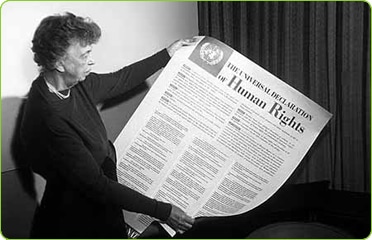The idea that every person is born free and with certain liberties is one that is very central to the U.S. “We hold these Truths to be self-evident, that all Men are created equal…..”, This commonly cited passage from the Declaration of Independence may be addressed in the civics curriculum, but discussing human rights is not always as easy as it may seem. At Listenwise, we offer a wide selection of stories that can facilitate meaningful discussions of human rights and various moments in history when human rights have been challenged and defended.

December is a good month to talk about human rights is because in 1948, as human rights violations from WWII were being investigated and prosecuted and the Nuremberg trials were fresh in many people’s minds, the United Nations declared December 10th International Human Rights Day. On this day in 1948, the UN published “The Universal Declaration of Human Rights.” This document, composed of 30 different articles, delineates the basic universal rights that every member of the human race should be afforded. Check out the document in its entirety here. This year2018 is the 70th anniversary of “The Universal Declaration of Human Rights,” and celebrations will be going on around the world as governments and people around the world honor the day and what it represents
A good place to start talking about human rights with Listenwise is the story Remembering the Rwandan Genocide.” The Rwandan Genocide was brought to the world’s attention in 2004, 20 years after it happened, through the film Hotel Rwanda. Use this story to talk to students about the ways that people may justify horrendous crimes against others.
Engaging students in a global mindset can be difficult without a point of reference for them. Use this story about the 1968 Prague Spring to help students understand how events in other parts of the world can affect a global audience. Refer to these stories about different protests around the world to explore how these events relate to each other:
- Looking Back at Beijing’s Tiananmen Square Protest, 25 Years Later
- Women in Iran Protest Wearing Headscarves
- Civil Rights Protests with Martin Luther King, Jr.
Education in Kabul, A World of War is another Listenwise story that could be a helpful resource for educators interested in talking about how human rights are affected by politics. Argentina’s Dirty War explores how the military coup of 1974 changed Argentina and how the politics of the U.S. affected the lives of Argentinians. Using stories like these to talk about the ways that individuals might be oppressed by large entities like governments can help students understand the value of each person’s civic engagement.
Celebrating and observing themes like these in the classroom can be challenging because of the sensitivity of the matters at hand. However, empowering students to be comfortable, knowledgeable, and skilled in discussing complex issues like Universal Human Rights can to help prepare them for navigating the world outside of school.
Browse our lesson collection here to find more stories that fit your teaching goals.
